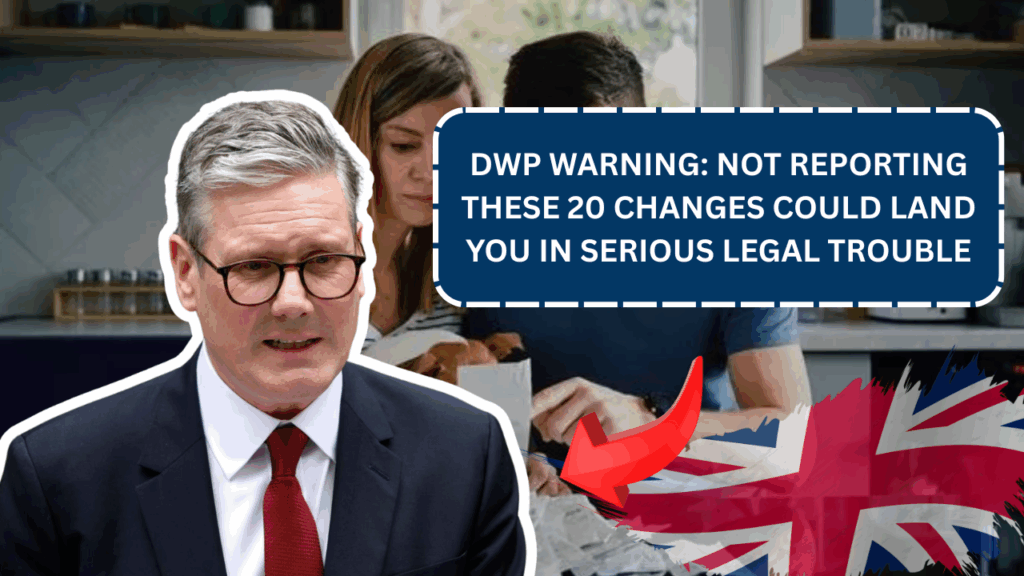If you’re receiving financial support from the UK’s Department for Work and Pensions (DWP), you have a legal duty to keep your benefit information up to date. Not reporting certain changes in your personal or financial circumstances could lead to overpayments, repayment demands, penalties, or even criminal prosecution for benefit fraud.
The DWP considers failure to report specific life changes as fraud, especially if done intentionally to receive extra payments. Below is a list of 20 changes that must be declared as soon as they occur to avoid getting into trouble.
1. Change of Name or Gender
If you legally change your name or gender, you must notify the DWP. Documentation may be required as proof.
2. Starting or Ending a Job
Any employment-related change — whether you start, stop, or change jobs — must be reported immediately. This includes part-time and freelance work.
3. Changes in Income
Even if you’re already working, any increase or drop in income can affect your benefit amount. You must update your records to stay compliant.
4. Education or Training Status
If you or someone in your household starts or ends a course, apprenticeship, or training, the DWP needs to know.
5. Moving House
Your address plays a role in the benefits you’re entitled to. If you move to a new home, report it without delay.

6. People Moving In or Out
Adding a new housemate, lodger, partner, or dependent — or someone leaving your home must be reported, as it can change your benefit eligibility.
7. Death in the Household
If your partner, a family member, or someone else in your home dies, notify the DWP. This may affect your payments.
8. Having a Baby
Adding a new member to your family will impact your benefit entitlements. Ensure you report the birth of a child as soon as possible.
9. Becoming or Ceasing to Be a Carer
If you start or stop caring for someone (such as an elderly relative), it may affect both your benefits and theirs.
10. Changes in Marital or Civil Partnership Status
Getting married, divorced, or entering/leaving a civil partnership are all key updates to report to avoid receiving incorrect payments.
11. Travel Abroad
Leaving the UK for any duration may impact your benefits. You must report if you plan to be abroad — even temporarily.
12. Hospital Stays or Going into a Care Home
A prolonged stay in hospital or moving into a care facility can reduce or pause some benefits. Always inform the DWP beforehand.
13. Change in Health or Disability Status
If your health condition worsens or improves or if you’re newly diagnosed with a long-term condition you should update the DWP.
14. Switching Doctors
Changing your GP might seem like a small administrative detail, but it’s another factor the DWP tracks for certain health-related benefits.
15. Change in Savings, Investments, or Property
Any increase or decrease in your financial assets (including buying or selling a property) can affect means-tested benefits.
16. Other Income Sources
Student grants, bursaries, sick pay, private pensions, or money received from other sources must be reported.
17. Changes to Other Benefits
If your benefits or those of someone you live with have changed (increased, decreased, started, or stopped), this must be declared.
18. Receiving Back Payments
Getting a lump sum from backdated wages, compensation, or benefits needs to be reported. It might push your savings above benefit thresholds.
19. Immigration Status Changes
Non-British citizens must report any updates in their visa or residency status to ensure continued benefit eligibility.
20. Starting or Stopping Volunteering
Even unpaid work can influence your benefit assessment. Inform the DWP if you begin or end voluntary service.
What Happens If You Don’t Report?
Failing to report any of the above changes can result in overpayments, which the DWP will demand you repay. If they believe you misled them intentionally, it can lead to penalties ranging from fines of £350 to £5,000, loss of benefits, or even prosecution and a criminal record.
In 2023, the UK government increased efforts to detect benefit fraud through data-matching programs and investigations. The consequences are serious even if the failure was accidental.
How to Report a Change
If you’re receiving Universal Credit, you can report changes through your online account.
For other benefits like Personal Independence Payment (PIP), Housing Benefit, or Employment and Support Allowance (ESA), you must contact the DWP via phone or use the correct reporting page.
Universal Credit helpline: 0800 328 5644
PIP helpline: 0800 121 4433
General DWP contact info: DWP Contact Page
Conclusion
Receiving benefits is a vital lifeline for millions of UK residents, but with it comes the responsibility of keeping your information up to date. The DWP has clearly outlined 20 changes you must report failure to do so isn’t just a minor oversight, it could be considered fraud.
If you’re unsure whether a change needs reporting, it’s always better to check via the official GOV.UK portal. When in doubt, report it it could save you from financial trouble or even legal consequences later on.





